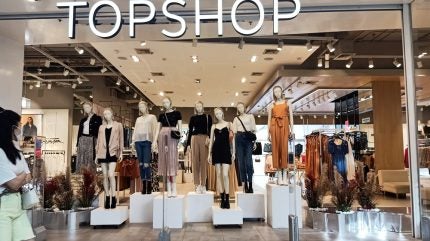
UK newspaper the Sunday Times reports online retailer ASOS rejected a joint £215.5m bid for Topshop and Topman from Shein and US fashion giant ABG.
The newspaper claims Shein and ABG were “on the cusp of agreeing a deal” with Asos but were told it would not proceed shortly before the deal with Heartland was announced. Shein refused to comment when approached by Just Style.
Asos said Heartland’s 75% stake is worth £135m ($177.69m). Asos Holding Limited will retain a 25% stake and the right to sell a further 5% interest to the Heartland Shareholder for £9m.
Topshop and Topman products will continue to be sold on the Asos website.
Commenting on the initial Heartland agreement, José Antonio Ramos Calamonte, Asos’ chief executive, said: “The joint venture and the launch of the refinancing will accelerate our strategy to both offer customers the best and most relevant product and to turn Asos into a company that delivers sustainable, profitable growth.”
Why did Shein and ABG want Topshop?
Louise Deglise-Favre, apparel analyst at GlobalData told Just Style Shein’s attempt to acquire Topshop was not surprising and “fits with its overall strategy to purchase well-established struggling brands within key markets”.
How well do you really know your competitors?
Access the most comprehensive Company Profiles on the market, powered by GlobalData. Save hours of research. Gain competitive edge.

Thank you!
Your download email will arrive shortly
Not ready to buy yet? Download a free sample
We are confident about the unique quality of our Company Profiles. However, we want you to make the most beneficial decision for your business, so we offer a free sample that you can download by submitting the below form
By GlobalData“Shein has already applied this acquisition template to varying extents with Forever 21 in the US and Missguided in the UK,” she added.
However, there were clearly some concerns from Asos on the deal.
Why did Asos choose Heartlands instead?
Clive Black, head of consumer research at Shore Capital, told Just Style it is clear Asos is keen to retain some involvement with the Topshop and Topman brands, particularly after spending £300m on the brands in 2021.
GlobalData retail analyst Neil Saunders told Just Style: “As Asos has retained a stake in Topshop, it wants a partner that will nurture and grow the brand. Given what happened with Ted Baker under ABG, this may have deterred Asos from going for that bid.”
Earlier this year, ABG named United Legwear & Apparel Co, BCI Brands and Peerless Clothing as licensing partners for Ted Baker in the US after the brand became insolvent in the UK and Europe.
Saunders added that it would also not have been sensible for Asos to partner with a competitor such as Shein. He said Heartland is likely to “work more in the interests of Asos,” even without the reach and power of ABG and Shein.
Deglise-Favre agreed, adding: “From ASOS’ perspective, selling Topshop to Shein would have potentially meant helping its direct competitor further strengthen its position in its home market through a highly recognisable brand, which would be strategically unsound.”
She also noted the difference in price position between Topshop and Shein. “Consumers might have expressed concerns that Shein would downgrade the brand to become another affordable fast-fashion brand in an already relatively saturated market,” she added.
What next for Asos?
Following the deal – which was announced alongside a restructure – Black said Asos has “moderately reduced debt but remains highly leveraged and has replaced low-cost debt with the very high-cost variety.”
“Asos continues to lose market share in the UK, not exactly advancing in Europe or the US, and remains loss-making and cash-burning.”



